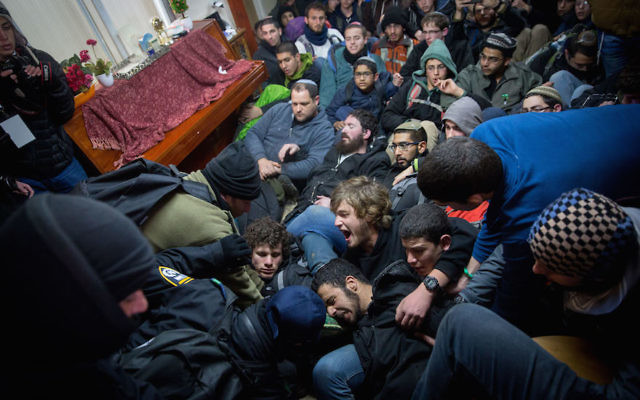Deep divisions over Amona evacuation
Some 60 Israeli police officers were recovering from injuries this week, after being attacked by pro-settler activists who turned violent to oppose an outpost evacuation.

JERUSALEM – Some 60 Israeli police officers were recovering from injuries this week, after being attacked by pro-settler activists who turned violent to oppose an outpost evacuation.
Israel’s Public Security Minister Gilad Erdan said on Sunday that authorities will scour hours of video to identify the “hooligans” who attacked police, and make further arrests on top of the 13 made during the evacuation.
Officers were worst hurt when the synagogue in the Amona outpost became a battleground, where activists threw stones, fire extinguishers, metal bars and other objects at them. During the course of the two-day evacuation, one officer was badly hurt by corrosive liquid which was hurled at his face.
Opposition Leader Isaac Herzog said that there is a “direct line” between this kind of violence and that of the Jewish men who carried out a fatal arson attack in a Palestinian village in 2015.
Hundreds of activists – seething that the 45 families of Amona were being forced by a High Court decision to leave their caravans and houses and return the land to its Palestinian owners – flocked to the village to protest the evacuation last week. Some did so peacefully, others embraced violence.
Now, the settler movement is gearing up for another face-off with the authorities to try to prevent an evacuation at the settlement of Ofra in a month, where nine homes built on private land are slated for -demolition.
On Sunday in Ofra, there was a large demonstration against this plan and the Amona evacuation. “Throwing Jews from their homes,” exclaimed Avi Roeh, the head of the settler lobby group the Yesha Council, “reflects the stories of exile, of destruction, a fire and deportation. And here in the Land of Israel they are doing it.”
But Israeli judges rejected settler arguments and said that if construction takes place on privately owned Palestinian land and the landowners don’t want to sell, they’re entitled to have the settler homes demolished. Yesh Din, the Israeli organisation that helped the Palestinians who own the Amona land to bring their legal case, says that justice was done.
One of the landowners, Maryam Hamad, wrote in Haaretz, “I’ve waited so many years for this moment and always believed it would finally come.”
She wrote: “I’ve never understood how the settlers could come, take my land and tell me it was God’s will. That’s land confiscation. They took my land against my will.”
To Amona resident Eli Greenberg, the claims of Hamad and the other landowners represented a mere “bureaucracy”. He claimed in an interview with The AJN: “Amona was destroyed because of a technicality.” In his view, a solution should have been forced on them.
He hastened to add that he thinks that private ownership claims of Palestinians are “a fiction” as the Land of Israel is, by historical rights, Jewish, and anybody who gave ownership to Arabs did so without rights. “The Israeli court said that the thieves are the owners,” he complained. His outlook echoes some leading settler rabbis, including Shlomo Aviner, who told The AJN that he thinks the Palestinian landowners inherited their property via a “chain of thieves”.
The Amona evacuation has sent Israeli politics into a frenzy, with the right wing determined to make it a turning point in West Bank policies, including through the new law intended to prevent future
evacuations.
During and after the evacuation, politicians used language which, even in the no-holds-barred Israeli content, was extreme. “When a woman is raped it hurts, and what is happening here is a brutal rape,” claimed Bezalel Smotrich, a Knesset member for the Jewish Home party, when he arrived at Amona.
The settler movement’s anger is directed at the Israeli establishment, including the courts, the government and the police. It was the courts that ruled two years ago that the outpost must be demolished because it stood on land which is privately owned by Palestinians who refused to sell. Activists had lobbied the government to prevent the evacuation, and then claimed that police should have been more gentle with activists on evacuation day.
“This is judicial tyranny that is raping us, raping the government, raping elected officials, raping those who received a mandate from the people,” Smotrich argued. “We want to build the settlement enterprise, to develop it.”
Gilad Grossman of Yesh Din told The AJN that he thinks politicians like Smotrich are being irresponsible for opposing the authority of the High Court. “Though it wasn’t a nice sight, it was an important day for the rule of law in Israel,” he said.
Centrist politicians like Tzipi Livni are taking a similar line, saying that the anger is misplaced, as private property must be respected. Livni told the Knesset that while some are saying that the evacuation represents a low point for Israel, she disagrees. She argued, “A day on which the State of Israel is enforcing the law will never be ‘a black day for Zionism’.”
NATHAN JEFFAY

comments